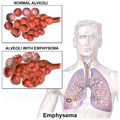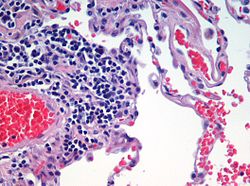Emphysema

Emphysema is an obstructive disease of the lungs.
It is one of the diseases that make up chronic obstructive pulmonary disease (COPD). This is a set of diseases where the flow of air in the lungs is obstructed. Emphysema is most often caused by smoking but can be caused by other diseases or have no known cause at all.
It occurs when the very small air sacs (called the alveoli) at the ends of the airways in the lungs start to break down from many sacs to form much bigger sacs. The alveoli are the areas of the lung where oxygen and carbon dioxide are exchanged into and out of the blood. Emphysema makes it hard for people to blow air out of the lungs because air gets trapped inside the broken alveoli due to the collapse of the walls. The trapped air in the lungs creates the characteristic "barrel chest" of emphysema.
There is no cure for emphysema. Treatment includes stopping smoking and taking medicines ('broncho-dilators' and sometimes corticosteroids). Supplemental oxygen is recommended in those with low oxygen levels at rest. It decreases the risk of heart failure and death if used 15 hours per day, and may improve people's ability to exercise. In those with normal or mildly low oxygen levels, oxygen supplementation may improve shortness of breath. There is a risk of fires and little benefit when those on oxygen continue to smoke.
Associations
Emphysema is commonly associated with chronic bronchitis. As it is rather difficult to delineate "pure" cases of emphysema or chronic bronchitis they are classed together into chronic obstructive pulmonary disease (COPD).
Emphysema Media
CT scan of bullous emphysema
Giovanni Battista Morgagni, who recorded one of the earliest descriptions of emphysema in 1769
Other websites
- Global initiative for chronic obstructive lung disease Archived 2016-04-25 at the Wayback Machine







